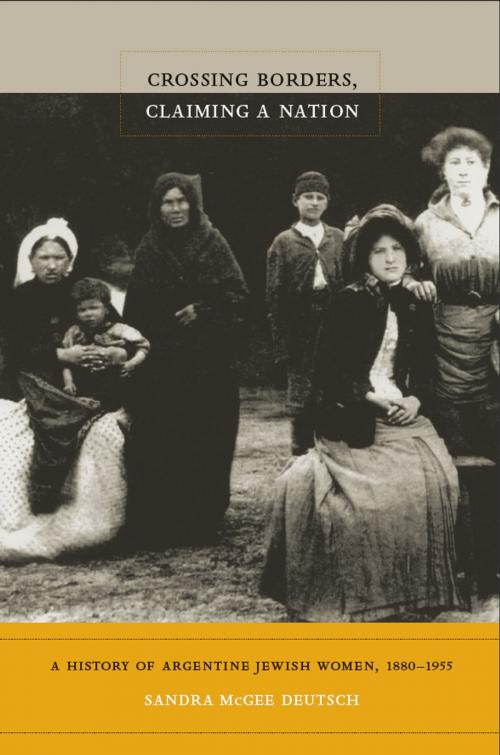Crossing Borders, Claiming a Nation
A History of Argentine Jewish Women, 1880–1955
Nonfiction, History, Americas, South America, Jewish, Social & Cultural Studies, Social Science, Gender Studies, Women&| Author: | Sandra McGee Deutsch | ISBN: | 9780822392606 |
| Publisher: | Duke University Press | Publication: | July 13, 2010 |
| Imprint: | Duke University Press Books | Language: | English |
| Author: | Sandra McGee Deutsch |
| ISBN: | 9780822392606 |
| Publisher: | Duke University Press |
| Publication: | July 13, 2010 |
| Imprint: | Duke University Press Books |
| Language: | English |
In Crossing Borders, Claiming a Nation, Sandra McGee Deutsch brings to light the powerful presence and influence of Jewish women in Argentina. The country has the largest Jewish community in Latin America and the third largest in the Western Hemisphere as a result of large-scale migration of Jewish people from European and Mediterranean countries from the 1880s through the Second World War. During this period, Argentina experienced multiple waves of political and cultural change, including liberalism, nacionalismo, and Peronism. Although Argentine liberalism stressed universal secular education, immigration, and individual mobility and freedom, women were denied basic citizenship rights, and sometimes Jews were cast as outsiders, especially during the era of right-wing nacionalismo. Deutsch’s research fills a gap by revealing the ways that Argentine Jewish women negotiated their own plural identities and in the process participated in and contributed to Argentina’s liberal project to create a more just society.
Drawing on extensive archival research and original oral histories, Deutsch tells the stories of individual women, relating their sentiments and experiences as both insiders and outsiders to state formation, transnationalism, and cultural, political, ethnic, and gender borders in Argentine history. As agricultural pioneers and film stars, human rights activists and teachers, mothers and doctors, Argentine Jewish women led wide-ranging and multifaceted lives. Their community involvement—including building libraries and secular schools, and opposing global fascism in the 1930s and 1940s—directly contributed to the cultural and political lifeblood of a changing Argentina. Despite their marginalization as members of an ethnic minority and as women, Argentine Jewish women formed communal bonds, carved out their own place in society, and ultimately shaped Argentina’s changing pluralistic culture through their creativity and work.
In Crossing Borders, Claiming a Nation, Sandra McGee Deutsch brings to light the powerful presence and influence of Jewish women in Argentina. The country has the largest Jewish community in Latin America and the third largest in the Western Hemisphere as a result of large-scale migration of Jewish people from European and Mediterranean countries from the 1880s through the Second World War. During this period, Argentina experienced multiple waves of political and cultural change, including liberalism, nacionalismo, and Peronism. Although Argentine liberalism stressed universal secular education, immigration, and individual mobility and freedom, women were denied basic citizenship rights, and sometimes Jews were cast as outsiders, especially during the era of right-wing nacionalismo. Deutsch’s research fills a gap by revealing the ways that Argentine Jewish women negotiated their own plural identities and in the process participated in and contributed to Argentina’s liberal project to create a more just society.
Drawing on extensive archival research and original oral histories, Deutsch tells the stories of individual women, relating their sentiments and experiences as both insiders and outsiders to state formation, transnationalism, and cultural, political, ethnic, and gender borders in Argentine history. As agricultural pioneers and film stars, human rights activists and teachers, mothers and doctors, Argentine Jewish women led wide-ranging and multifaceted lives. Their community involvement—including building libraries and secular schools, and opposing global fascism in the 1930s and 1940s—directly contributed to the cultural and political lifeblood of a changing Argentina. Despite their marginalization as members of an ethnic minority and as women, Argentine Jewish women formed communal bonds, carved out their own place in society, and ultimately shaped Argentina’s changing pluralistic culture through their creativity and work.















